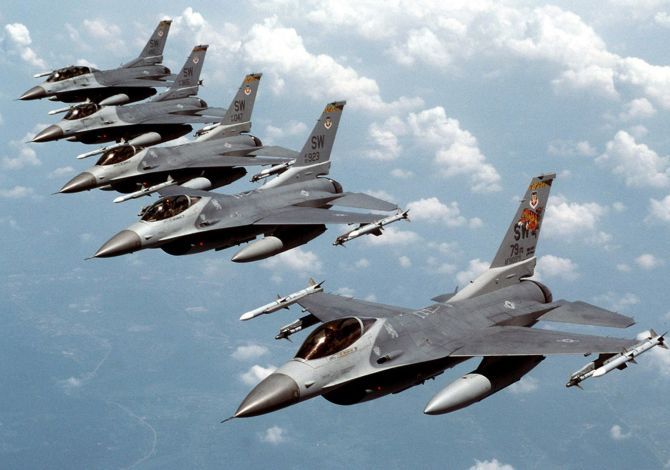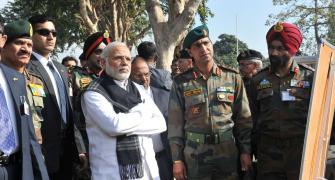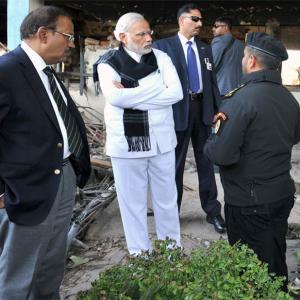'The Senators were playing safe, not angering either the pro-India lobby or the pro-Pakistan lobby, but perhaps more importantly, the military-industrial complex -- the most powerful lobby of all -- which the majority of Senators are beholden to in terms of largesse to their campaign coffers.'
Aziz Haniffa/Rediff.com reports from Washington, DC.

Notwithstanding a chorus of influential US Senators, scholars and policy wonks in leading think-tanks voicing strong opposition to the Obama administration's decision to provide Pakistan eight F-16 fighter jets, when it came to a vote on a resolution aimed at blocking the sale, the full Senate pushed it to the backburner by a vote of 71-24.
Citing a provision in the 1976 Arms Export Control Act, Senator Rand Paul, the Kentucky Republican, attempted to win Senate approval of his Resolution of Disapproval on the sale. However, the Senate voted overwhelmingly to table Senator Paul's Resolution of Disapproval.
In the US, to 'table' usually means to postpone or suspend consideration of a resolution, legislation or a pending motion -- which essentially means shelving it -- unlike in the United Kingdom or Commonwealth countries and the rest of the English-speaking world, where 'tabling' vis-a-vis parliamentary procedure means the opposite -- to begin consideration or reconsideration of a piece of legislation, or a resolution as introduced by Paul or any other such proposal.
The Senate's decision on Paul's resolution came despite a passionate appeal by Senator Mark Warner, the Virginia Democrat and co-chair of the US Senate India Caucus.
The vote by the Senate to table the Resolution of Disapproval to block the sales of the F-16s was a victory for the Obama administration -- not to mention Islamabad -- which had announced on February 12 that it had approved the $700 million sale of the aircraft as well as radar and other equipment to Pakistan.
In his intervention on the Senate floor, Senator Warner warned, 'If we move forward with these sales without putting some markers down, I think we potentially not only do damage to holding Pakistan's feet to the fire in terms of the threat of terrorists in Afghanistan and elsewhere in the region, but also potentially could do damage to one of the most important relationships our country has, and that is the strategic relationship between the United States and India.'
'This relationship has been one of enormous growing importance,' Senator Warner pointed out. 'India has been a valuable and strategic partner of the United States and is a tremendous ally in promoting global peace and security.'
'That has not always been the case," Senator Warner recalled. 'Relations between our two nations have been steadily improving over the past decade, ranging from approvals of the civilian nuclear agreement to frequent coordination between our militaries and at this point, over a $100 billion in bilateral trade.'
'Prime Minister Modi in India has made a personal commitment to improving the ties between the United States and India. The prime minister will come back to the United States at the end of this month (to attend the Nuclear Security Summit),' he added.
'Nowhere is the potential for our strategic relationship greater than in our bilateral defence relationship, which again, has seen great progress over the last decade,' Senator Warner argued and noted, 'Last year our two nations signed the framework that will advance military-to-military exchanges.'
'We're also proceeding with joint development of defence technology which seeks to increase defence sales and create a cooperative technology and industrial relationship that can promote both the capability in the United States and in India,' he said.
'So I viewed with some concern last month when the administration announced the sale of these eight F-16s to Pakistan,' Senator Warner said. 'And again I want to commend the leadership of the Foreign Relations Committee for making very clear that even if this sale should go forward, the financing of this sale is still subject to further American review.'
'What brings me to support Senator Paul's resolution is the fact that as recently as January of this year, Pakistani-based terrorists claimed responsibility for an attack against an Indian military base at Pathankot. It resulted in the killing of Indian military forces and a great tragedy.'
'So far Pakistan has refused to share intelligence or to turn over those suspects to the Indian government,' Senator Warner informed his Senate colleagues.
'With those kind of actions, I cannot go ahead and continue this policy where we continue to, in effect, give Pakistan a pass, whether it is actions in the region vis-a-vis Afghanistan or within their own country but also in terms of their unwillingness to meet India even halfway in terms of trying to bring a greater stability to one of the regions that could potentially be a tinderbox in terms of the border regions between India and Pakistan.'
'So I will be supporting Senator Paul's resolution. I hope that the government in Pakistan hears the concern of this Senator and other Senators. I hope they will act aggressively in terms of bringing the justice those terrorists who invade Indian space and attacked the Indian Air Force base showing that kind of responsible behaviour might lead at least this Senator taking a different view in terms of future military sales,' he added.
By tabling the resolution, the Senators were playing safe, not angering either the pro-India lobby or the pro-Pakistan lobby, but perhaps more importantly, the military-industrial complex -- the most powerful lobby of all -- which the majority of Senators are beholden to in terms of largesse to their campaign coffers -- that frowns upon any effort to torpedo foreign military sales which yields massive profits to their shareholders.
Last month, Secretary of State John F Kerry, in declaring the administration's intent to push forward with the F16 sales despite India's protests -- including Foreign Secretary Dr S Jaishankar summoning US Ambassador to India Richard Verma and expressing New Delhi's deep disappointment over Washington's decision -- argued that these fighter aircraft 'have been a critical part of the Pakistani fight against the terrorists in the western part of that country, and have been effective in that fight.'
'We don't want to do things that upset the balance,' Kerry said, and maintained during a Congressional hearing that 'Pakistan is engaged legitimately in a very tough fight against identifiable terrorists in their country.'
During that hearing before the House Foreign Affairs Committee, Representative Eliot Engel of New and the ranking Democrat on the panel, said, 'I'm concerned that Pakistan continues to play a double game, fighting terrorism that has a direct impact inside Pakistan, and supporting it in places like India and Afghanistan, where Pakistan believes such a policy furthers its national interests.'
US Congressman Dr Amerish 'Ami' Bera, the California Democrat and the only Indian-American member of the US Congress, questioned Kerry during the hearing about the administration's decision to sell Pakistan these fighter aircraft and emphasised the importance of ensuring Pakistan is cracking down on terrorists in the country before a sale can be made.
'Pakistan must prove it is taking substantive steps to go after all terrorist groups in the country before we move forward with the sale of F16s,' Dr Bera said.
'So far,' he pointed out, 'Pakistan has not shown willingness to go after groups like the Haqqani network and Lashkar-e-Tayiba, which is why I cannot support a sale at this time.'
'Furthermore, in the event that we do proceed with a sale,' Dr Bera added, 'US taxpayers should not subsidise the cost of the F16s. If Pakistan wants to buy the planes they should pay for them.'
Earlier, in a formal notification to Congress which coincided with a published federal notification, the Defence Security Cooperation Agency wrote to House Speaker Paul Ryan that 'this proposed sale contributes to US foreign policy objectives and national security goals by helping to improve the security of a strategic partner in South Asia.'
'This sale will increase the number of aircraft available to the Pakistan air force to sustain operations, meet monthly training requirements, and support transition training for pilots new to the Block-52,' the notification in the Federal Register noted. 'Pakistan will have no difficulty absorbing these additional aircraft into its air force.'
The the Defence Security Cooperation Agency in its notification said 'this sale involves the release of sensitive technology to Pakistan,' pointing out that 'the F-l 6C/D Block 50/52 weapon system uses the F-16 airframe and features advanced avionics and systems.'
It contains the Pratt and Whitney F-100-PW-229 engine, AN/APG-68V(9) radar, digital flight control system, external electronic warfare equipment, Advanced Identification Friend or Foe (AIFF), LINK-16 datalink, and software computer programmes, the Defence Security Cooperation Agency added.
'If a technologically advanced adversary were to obtain knowledge of the specific hardware or software source code in this proposed sale,' the federal notification acknowledged, 'the information could be used to develop countermeasures which might reduce weapon system effectiveness or be used in the development of systems with similar or advanced capabilities.'
Justifying the sale, the notification argued, 'The benefits to be derived from this sale in the furtherance of the US foreign policy and national security objectives outweigh the potential damage that could result if the sensitive technology were revealed to unauthorised persons.'
Sartaj Aziz, Pakistan Prime Minister Nawaz Sharif's adviser on foreign affairs who was in Washington last week to co-chair the US-Pakistan Strategic Dialogue with Kerry, told the Defence Writers Group that Pakistan had initially requested 18 F-16s, but because of 'financing problems' it had decided to go with buying eight fighter aircraft.
'In the last five years the Pakistan air force has been saving US assistance to be able to finance these F-16s,' Aziz said. 'That is why, the administration has recommended that these should be sold because it is a very critical part of our counter terrorism operation.'
Acknowledging that the aircraft would continue to be used in Pakistan's tribal regions, Aziz said, 'This is part of our fleet and for the last two, three years they have extensively been used in tribal areas. Right now the specialised need is the counter-terrorism operation, for which we are heavily dependent on F-16s.
'The simple fact is that Pakistan doesn't need F-16s to counter terrorism,' Michael Rubin, a foreign and defence policy analyst at the neo-conservative American Enterprise Institute wrote, 'it needs F-16s to mount attacks against India.'
'The best strategy to help Pakistan counter terrorism would instead be some tough love, withdrawing military assistance and augmenting India's qualitative military edge until such a time as Pakistani authorities -- and especially Pakistan's intelligence service (the ISI) -- stops supporting the Taliban, Lashkar-e Tayiba, and a host of other terrorist groups,' Rubin noted.
'There's a shell game going on in which Pakistan demands aid because of the threat posed by Islamist radicals,' Rubin said, 'but then the ISI supports many of those same radicals in order to win a greater payoff.'
'It's time to stop rewarding bad behaviour, stop providing Pakistan with weaponry it could use against India, and start holding its feet to the fire instead,' Rubin said, and added, 'At the very least, Senator John McCain, chairman of the Senate Armed Services Committee, is right to suggest that Congress should hold hearings before the sale of F-16s to Pakistan goes through.'










